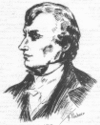Robert Finley
| Robert Finley | |
|---|---|
 | |
| President of the University of Georgia | |
|
In office 1817–1817 | |
| Preceded by | John Brown |
| Succeeded by | Moses Waddel |
| Personal details | |
| Born |
1772 Princeton, New Jersey |
| Died |
October 3, 1817 (aged 44–45) Athens, Georgia |
| Children | Robert Finley, Rev., Esther Caldwell |
| Alma mater | Princeton University |
Robert Finley (1772 – October 3, 1817) was briefly the president of the University of Georgia. He initiated the American Colonization Society which founded Liberia. Finley was born in Princeton, New Jersey, and graduated from College of New Jersey (later renamed Princeton University) at the age of 15.
Early life
Finley was born in Princeton, New Jersey, in 1772 to James Finley and Ann Angrest. His father, James Finley, was born 1737 in Glasgow, Scotland, where he was trained as a yarn merchant and where he became acquainted with Rev John Witherspoon who was then a pastor in the town of Paisley about six miles from Glasgow. James immigrated to New Jersey in 1769. His paternal grandparents were James Finley from Paisley, and Ann McDonald.
Career
Robert Finley entered the College of New Jersey at the age of 11 and graduated in 1787.[1] He taught at several places, including Charleston, South Carolina, where many slaves existed. The Presbytery of New Brunswick, New Jersey licensed him as a minister in 1794. Finley returned to Princeton in 1793 to study Theology, and served as a tutor, eventually becoming a trustee of the university from 1806 until his resignation in 1817. In 1795, he was ordained as the Pastor of the Presbyterian Church at Basking Ridge, where he served for 20 years as a popular preacher and noted educator, and originated the concept of the modern Sunday School curriculum.[2]
Finley taught at the Princeton University Grammar School;[2] and at the Basking Ridge, New Jersey Classical School (Brick Academy), serving there from 1795 until his acceptance of the University of Georgia (UGA) presidency in July, 1817.
In 1795, Dr. Robert Finley, re-established the private academy, known as the Basking Ridge Classical School, conducting classes first at the Presbyterian parsonage and then in a new frame school building erected near the church. In 1809, with enrollment expanding, Finley organized financing and construction of a new two-story brick building prominently located in the center of the village of Basking Ridge (Brick Academy).
Boys from the local area and from far away places like Virginia and New York City attended this exclusive school and most were given a classical education in preparation to enter the College of New Jersey (later renamed Princeton University). Students boarded with Dr. Finley and other local residents. Two buildings still standing near the Brick Academy were later used as dormitories.
Dr. Finley and Samuel John Mills helped organize the National Colonization Society of America and the American Colonization Society at Washington, D.C. in 1816 and 1817. Contributions were solicited from many contemporaries, including former students such as Charles Muir Campbell.
Finley fell ill while traveling south to assume his new position at the University of Georgia. He died only three months after arriving and is buried in Jackson Street Cemetery on the school's north campus in Athens, Georgia.
Archival Collections
The Presbyterian Historical Society in Philadelphia, Pennsylvania, has sermons and a Latin manuscript from Robert Finley in its collections.
References
- ↑ Finding Aid to the Robert Finley Papers at the Presbyterian Historical Society http://www.history.pcusa.org/collections/findingaids/fa.cfm?record_id=368
- 1 2 Laurie, Maxine N.; and Mappen, Marc; Encyclopedia of New Jersey: Rutgers University Press; 2004/2005. P. 273.
Sources
![]() This article incorporates text from a publication now in the public domain: Gilman, D. C.; Thurston, H. T.; Colby, F. M., eds. (1905). "article name needed". New International Encyclopedia (1st ed.). New York: Dodd, Mead.
This article incorporates text from a publication now in the public domain: Gilman, D. C.; Thurston, H. T.; Colby, F. M., eds. (1905). "article name needed". New International Encyclopedia (1st ed.). New York: Dodd, Mead.
External links
| Preceded by John Brown |
President of the University of Georgia 1817 |
Succeeded by Moses Waddel |